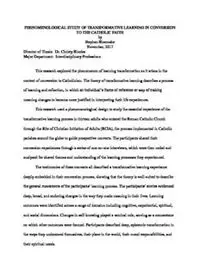Table Of ContentPHENOMENOLOGICAL STUDY OF TRANSFORMATIVE LEARNING IN CONVERSION
TO THE CATHOLIC FAITH
by
Stephen Bloemeke
November, 2017
Director of Thesis: Dr. Christy Rhodes
Major Department: Interdisciplinary Professions
This research explored the phenomenon of learning transformation as it arises in the
context of conversion to Catholicism. The theory of transformative learning describes a process
of learning and reflection, in which an individual’s frame of reference or way of making
meaning changes to become more justified in interpreting their life experiences.
This research used a phenomenological design to study the essential experience of the
transformative learning process in thirteen adults who entered the Roman Catholic Church
through the Rite of Christian Initiation of Adults (RCIA), the process implemented in Catholic
parishes around the globe to guide prospective converts. The participants shared their
conversion experiences through a series of one-on-one interviews, which were then coded and
analyzed for shared themes and understanding of the learning processes they experienced.
The testimonies of these converts all described a transformative learning experience
deeply embedded in their conversion process, showing that the theory is well-suited to describe
the general movements of the participants’ learning process. The participants’ stories evidenced
deep, broad, and enduring changes in the way they made meaning in their lives. Learning
outcomes were identified across a range of domains including cognitive, experiential, spiritual,
and social dimensions. Changes in self-knowing played a seminal role, serving as a cornerstone
on which other outcomes were formed. Participants described deep, epistemic transformation in
the ways they understood themselves, their place in the world, their moral responsibilities, and
their spiritual needs.
The analysis also explored the relationship between the learning transformation and
engagement in the formal curriculum of their respective RCIA programs. While knowledge
transfer played a role in all cases, its import was generally underemphasized by the testimonies
of the participants. The programs were most influential when there was a clear impact on the
perspective transformations of the converts. Sense of community, group discussion, opportunity
for critical reflection, and the ability to connect the content to their new sense of self all play a
fundamental role in deepening the transformative learning outcomes the of the converts,
regardless of their current place in the process.
These findings provide a justification for using transformative learning theory as a
framework for understanding adult religious education. It also offers a foundation for measuring
the efficacy and relationship between formal instruction and learning outcomes in the context of
religious conversion.
PHENOMENOLOGICAL STUDY OF TRANSFORMATIVE LEARNING IN CONVERSION
TO THE CATHOLIC FAITH
A Thesis
Presented To the Faculty of the Department of Interdisciplinary Professions in the College of
Education
East Carolina University
In Partial Fulfillment of the Requirements for the Degree
Master of Arts in Education
in Adult Education
by
Stephen Bloemeke
November, 2017
© Stephen Bloemeke, 2017
PHENOMENOLOGICAL STUDY OF TRANSFORMATIVE LEARNING IN CONVERSION
TO THE CATHOLIC FAITH
by
Stephen Bloemeke
APPROVED BY:
DIRECTOR OF
THESIS: ____________________________________________________________
(Christy M. Rhodes, Ph.D.)
COMMITTEE MEMBER: ______________________________________________
(Steven W. Schmidt, Ph.D.)
COMMITTEE MEMBER: ______________________________________________
(Kathy Lohr, Ed.D.)
COMMITTEE MEMBER: ______________________________________________
(David Siegel, Ph.D.)
CHAIR OF THE DEPARTMENT
OF INTERDISCIPLINARY PROFESSIONS: _______________________________________
(J.Scott Glass, Ph.D.)
DEAN OF THE
GRADUATE SCHOOL: _______________________________________________
(Paul J. Gemperline, Ph.D.)
Table of Contents
LIST OF FIGURES ..................................................................................................................... viii
CHAPTER 1: INTRODUCTION ....................................................................................................1
Motivation .....................................................................................................................................1
Statement of Problem ....................................................................................................................2
Purpose ..........................................................................................................................................4
Research Questions .......................................................................................................................5
Transformative Learning ..............................................................................................................5
Definitions.....................................................................................................................................6
CHAPTER 2: LITERATURE REVIEW .........................................................................................7
Transformative Learning ..............................................................................................................7
Transformation as an Epistemic Process ......................................................................................9
Issues in Transformative Learning..............................................................................................11
Transformation in Religious Education ......................................................................................12
Conversion in Catholicism ..........................................................................................................13
Transformation and Conversion .................................................................................................14
Transformative Goals in the Rite of Christian Initiation of Adults ............................................15
Gaps ............................................................................................................................................17
CHAPTER 3: METHODOLOGY .................................................................................................19
Phenomenological Research .......................................................................................................19
Theoretical Framework ...............................................................................................................20
Participant Selection ...................................................................................................................21
Limitations and delimitations in participant selection .......................................................22
Data Collection ...........................................................................................................................23
The interview process .................................................................................................................24
Transcription ...............................................................................................................................24
Data Analysis ..............................................................................................................................25
Coding the Data ..........................................................................................................................25
Stages of transformation .............................................................................................................25
Learning Outcomes .....................................................................................................................26
Transformative magnitude ..........................................................................................................26
Recoding .....................................................................................................................................27
Memos.........................................................................................................................................27
Emergent Phenomenology ..........................................................................................................27
Validity of the Research Process ................................................................................................28
Collecting and analyzing data ............................................................................................29
Transformative Learning ...................................................................................................29
Other Concerns ..................................................................................................................30
CHAPTER 4: RESULTS ...............................................................................................................32
Participant Backgrounds .............................................................................................................32
The Process of Transformation ...................................................................................................33
Early stages of transformation ...........................................................................................34
Middle stages of transformation .......................................................................................37
Protestants ..............................................................................................................38
Nonreligious ...........................................................................................................39
Late stages of transformation .............................................................................................40
Reintegration ......................................................................................................................42
Transformation in Multiple Contexts..........................................................................................43
Learning Outcomes .....................................................................................................................44
Self .....................................................................................................................................45
Behaviors ...........................................................................................................................47
Capacity .............................................................................................................................48
Ontology ............................................................................................................................49
Epistemology .....................................................................................................................50
Worldview..........................................................................................................................53
Model of Transformative Outcomes ...........................................................................................55
Entry ...................................................................................................................................55
Immersion ..........................................................................................................................56
Maturity..............................................................................................................................56
Applying the model: Hannah .............................................................................................57
Aligning Transformation and RCIA ...........................................................................................59
Entering RCIA ...................................................................................................................59
Acquiring knowledge ........................................................................................................59
Connecting RCIA to learning transformation ....................................................................60
Absence of connection .......................................................................................................61
Summary .....................................................................................................................................62
CHAPTER 5: DISCUSSION .........................................................................................................63
Who Am I? ..................................................................................................................................63
Recommendations for RCIA.......................................................................................................64
Evaluating Faith Formation ........................................................................................................67
Reconciling Religious and Educational Lenses ..........................................................................68
Making spirituality formulaic ............................................................................................68
Transformation and institutional authority ........................................................................68
Future Research ..........................................................................................................................70
Final Thoughts ............................................................................................................................71
REFERENCES ..............................................................................................................................72
APPENDIX A: INTERVIEW PROTOCOL .................................................................................76
APPENDIX B: PROVISIONAL CODE LIST ..............................................................................79
APPENDIX C: PARTICIPANT BACKGROUND .......................................................................81

